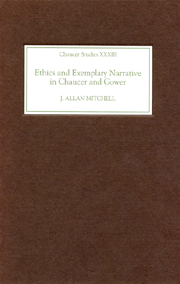Book contents
- Frontmatter
- Contents
- Acknowledgements
- Abbreviations
- Introduction
- 1 Reading for the Moral: Controversies and Trajectories
- 2 Rhetorical Reason: Cases, Conscience, and Circumstances
- 3 Gower For Example: Confessio Amantis and the Measure of the Case
- 4 All That Is Written For Our Doctrine: Proof, Remembrance, Conscience
- 5 Moral Chaucer: Ethics of Exemplarity in the Canterbury Tales
- 6 Pointing the Moral: The Friar, Summoner, and Pardoner's Satire
- 7 Griselda and the Question of Ethical Monstrosity
- Conclusion
- Bibliography
- Index
- CHAUCER STUDIES
Conclusion
Published online by Cambridge University Press: 12 September 2012
- Frontmatter
- Contents
- Acknowledgements
- Abbreviations
- Introduction
- 1 Reading for the Moral: Controversies and Trajectories
- 2 Rhetorical Reason: Cases, Conscience, and Circumstances
- 3 Gower For Example: Confessio Amantis and the Measure of the Case
- 4 All That Is Written For Our Doctrine: Proof, Remembrance, Conscience
- 5 Moral Chaucer: Ethics of Exemplarity in the Canterbury Tales
- 6 Pointing the Moral: The Friar, Summoner, and Pardoner's Satire
- 7 Griselda and the Question of Ethical Monstrosity
- Conclusion
- Bibliography
- Index
- CHAUCER STUDIES
Summary
If evil is a failure of the imagination, then from a practical point of view it becomes all-important that sufficient conditions for creative expression and reflection be established in and by culture. Imaginative literature in particular becomes indispensable for testing and expanding our moral intuitions; for showing what is entailed by living with timeless values in the contingencies of time and space; and for inspiring individuals to celebrate and seek after the right and the good. Ethical criticism and theory has in the last two decades been preoccupied with the nuances of literary expression in just this regard, urging that it provides the “thick description” that is so vital to moral education. Studying exemplary rhetoric can add to our understanding of the ethical potentialities of literature by broadening our conception of what it means for literature to engage practice.
Exemplary narratives too are capable of refining the moral sensibility. But as we have seen there is an aspect of the literature that can work to a more pragmatic end, and which stands out against the concerns of much current literary theory, preoccupied as it still is with the disinterested free play of the mind rather than with decision and action. Sidney should have been the first to remind us that, classically, poetry has its end in “well-doing and not… well-knowing only,” an eminently medieval distinction – what Gower describes as practique in contrast to theorique.
- Type
- Chapter
- Information
- Ethics and Exemplary Narrative in Chaucer and Gower , pp. 141 - 142Publisher: Boydell & BrewerPrint publication year: 2004



